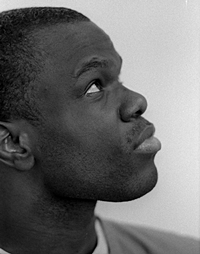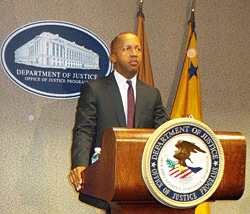
Photo credit: Glenn Paul.
Ian Manuel, one of many young people whose lives have been changed with the help of the Equal Justice Initiative, founded and directed by Bryan Stevenson.
Ian is one of many individuals who were incarcerated as children in adult facilities whose lives have been changed by EJI and its founder and executive director, Bryan Stevenson. A graduate of Harvard Law School and the John F. Kennedy School of Government, Stevenson has devoted his life to challenging what he calls the “excessive” punishment of many of America’s most vulnerable citizens: the economically disadvantaged, people of color, people with mental disabilities, and children.
On March 14, 2013, Stevenson visited the Office of Justice Programs to share his insights and perspectives on current challenges in the juvenile and criminal justice systems and the history behind those challenges. The United States currently has the highest incarceration rate of any country in the world. And, on any given day, 10,000 children are living in adult facilities.
Stevenson attributes these high numbers in part to predictions made in the late 1980s and early 1990s of an upsurge in the number of armed and violent youth offenders, called “super-predators.” In response to this perceived threat, many states enacted “get tough on crime” legislation, which lowered the minimum age for trying children as adults and facilitated the transfer of youth into the adult system. Several states mandated that children convicted or accused of certain kinds of crimes be prosecuted as adults.
—Bryan Stevenson,
Executive Director, Equal Justice Initiative.
Fourteen states currently have no minimum age for trying children as adults. Children as young as eight have been prosecuted as adults. In adult facilities, children have five times the risk of being sexually assaulted as they do in juvenile facilities. They also have a higher risk of physical assault and suicide.
 Bryan Stevenson, executive director of the Equal Justice Initiative.
Bryan Stevenson, executive director of the Equal Justice Initiative.“Data projections made in the early 1990s have not come true,” Stevenson said. “And yet this narrative [of super-predators], a narrative that is driven by fear and anger, has persisted,” Stevenson said. “These days, you don’t hear any more about the ‘best interest of the child.’ Our children, we’re not embracing them, encouraging them, or seeing them as victims. If we don't trust a young person to drive a car, how do we expect them to navigate the adult criminal justice system?"
Stevenson has guided cases that are changing the way the criminal justice system handles young offenders. In November 2009, Stevenson and other EJI attorneys argued before the U.S. Supreme Court for a constitutional ban on imposing death-in-prison sentences on children. On May 17, 2010, the Court issued a ruling in Graham v. Florida prohibiting the sentencing of juveniles to life without parole for nonhomicide crimes. The underlying principle of that decision was that children are uniquely immature, impulsive, and vulnerable, and they have a greater capacity for rehabilitation than adults. Therefore, they should not be punished as adults.
In March 2012, Stevenson argued before the Supreme Court that sentencing children to life in prison without parole for any crime violates the Eighth Amendment of the U.S. Constitution. On June 25, 2012, in a ruling on Miller v. Alabama and Jackson v. Hobbs, the Supreme Court prohibited sentencing approaches that mandate life without parole for juveniles convicted of homicide.
With each child whose case he handles, Stevenson takes more than a professional interest. “Kids don’t need you to be just a lawyer, but they need you as a parental figure too,” he said. In dealing with his clients, Stevenson is often at the ready with an arm around the shoulder, a piece of advice, or a kind word. He says, "I’m persuaded that without a hopeful orientation, we can’t change what needs to be changed.”
Resources:
For more information about the Equal Justice Initiative, visit the organization’s Web site. The text of the Supreme Court’s decisions in Graham v. Florida, Miller v. Alabama, and Jackson v. Hobbs is available online. To access more information and data about juveniles in court and other topics related to juvenile justice, visit the Web sites of the OJJDP-supported National Center for Youth in Custody, National Center for Juvenile Justice, and OJJDP's Statistical Briefing Book.
